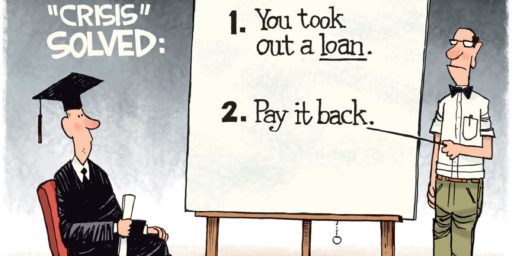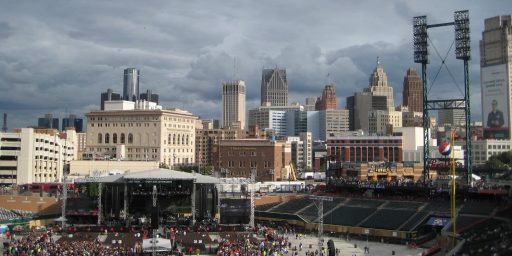Houses Cheaper than Cars in Detroit
You can buy a house in Detroit for $4000! It’ll be a fixer-upper, though.
As Detroit reels from job losses in the U.S. auto industry, the depressed city has emerged as a boomtown in one area: foreclosed property. It also stands as a case study in the economic pain from a housing bust as analysts consider whether a developing crisis in mortgages to high-risk borrowers will trigger a slowdown in the broader U.S. economy. The rising cost of mortgage financing for Detroit borrowers with weak credit has added to the downdraft from a slumping local economy to send home values plunging faster than many investors anticipated a few months ago.
[…]At least 16 Detroit houses up for sale on Sunday sold for $30,000 or less. A boarded-up bungalow on the city’s west side brought $1,300. A four-bedroom house near the original Motown recording studio sold for $7,000. “You can’t buy a used car for that,” said Izairi. “It’s a gamble, and you have to wonder how low it’s going to get.”
My guess is most of these are demolition projects rather than livable housing. And, as Michael Wilbon would say, a $4000 home doesn’t do you much good if you have to live in Detroit.
Carolyn O’Hara observes that, “Detroit is something of a special case, given that it has famously fallen on hard times, hemorrhaging jobs for more than a decade and struggling to cope with a poverty rate ringing in at over 30 percent. Nobody’s saying that as Detroit goes, so goes the rest of the country.” That’s for sure.
Still, she’s right to worry that “People are going to be defaulting on home loans left and right—a recent report estimated more than 2 million Americans could lose their homes because of the lending crisis—and that’s not going to spell growth for the U.S. economy.”
Now, CRL has an agenda and is likely vastly overestimating the number of foreclosure’s. There’s not much doubt, though, that there will be a ton of them. A lot of people bought more house than they could afford betting that they prices would keep going up and they would have enough equity to refinance. Some were smart or lucky enough to get out in time for that to happen; others weren’t. Short of passing a law to prevent people with moderate incomes from taking that kind of risk, I’m not sure how we avoid these outcomes.






We went through this in Texas when oil dropped to $12 a barrel (many years ago). We suddenly were seeing foreclosures right and left. We looked at a brand new 4000+ sq ft house in a good neighborhood and school district for $89,000. That’s $22.25 a sq ft for a standalone new house. I bought a house at 30% below the asking price. We sold it 16 years later at a hefty profit. And believe it or not, Texas is still here.
Regions go through this sort of thing when they are heavily dependant on a particular industry and then see that industry go south. Detroit started having it’s problems in the 1970’s.
Yep. It’s a mess to live through, though.
I got out of my townhouse in Ashburn probably at the very peak of the market through the sheer serendipity of getting married at that time. Had I held on to it, I’d have lost a substantial amount in paper profits but would have had to endure a much, much longer period hoping someone would buy when I did sell.
Anybody that bought near the peak of the market with either a short-term ARM or a sudden need to move could be in for a world of hurt, though.
James,
No doubt individuals can be in a world of hurt. When I bought, it just happened that was the low point of the market. In general, prices started to rise starting with the month we closed. When you sold, you sold at the top of the market.
On our first house, my wife and I paid off the mortgage. We had a fixed mortgage, but paid more per month to drive the principle down quicker, thus save hundreds of thousands of interest costs. I had some people tease me about putting some of my excess cash into my house vs the stock market. And they were right that I could have “made” more money in the stock market. And if I had invested in the stock market and then got out at the peak, I would be money ahead. But at the end of the day, stock took a heck of a hit, my house less so. And while I may have missed a chance to make more money, I also ensured that even if things got hairy, I would have a roof over my family.
My point is that people make risk assessments. If you get a balloon mortgage and the future doesn’t pan out, whose fault is that? At what level do we try to insure people from the future? And even if we don’t insure all from the future all the time, are so many people affected that we need to act even though in general we wouldn’t?
I think we get back to Reagan’s definition.
Recession is when a neighbor loses his job. Depression is when you lose yours.
If you get a balloon mortgage and the future doesn’t pan out, whose fault is that?
No argument from me on that one. It’s sad but not society’s responsibility. Still, when a large number of people make the same miscalculation, it can be add to local economic devastation. And vice versa, presumably.
Being a Michigan native, I have seen many ups & downs in the local economy. Since the dark days of the 78 – 80 recession/inflation cycle there, Michigan’s recovery has never been on a par with the rest of the country since.
We are only seeing the tip of the iceberg as far as housing foreclosures. Add to that the planned layoffs of the auto industry employees, & the trickle down effect to the parts suppliers, other businesses, & tourism, this bust will keep going south, leading to still more layoffs & foreclosures. While I also tend to scoff at the claim that real estate costs less than a used car, it is true that some foreclosed decent housing costs less than a new one.
I am also glad that as the auto industry goes, the rest of the country doesn’t go as badly.
I would like the name of the state agents that deal with cheap houses in Detroit. I am a cash buyer and I am interested in contacting these offices. Thanks in advance
Mercedes